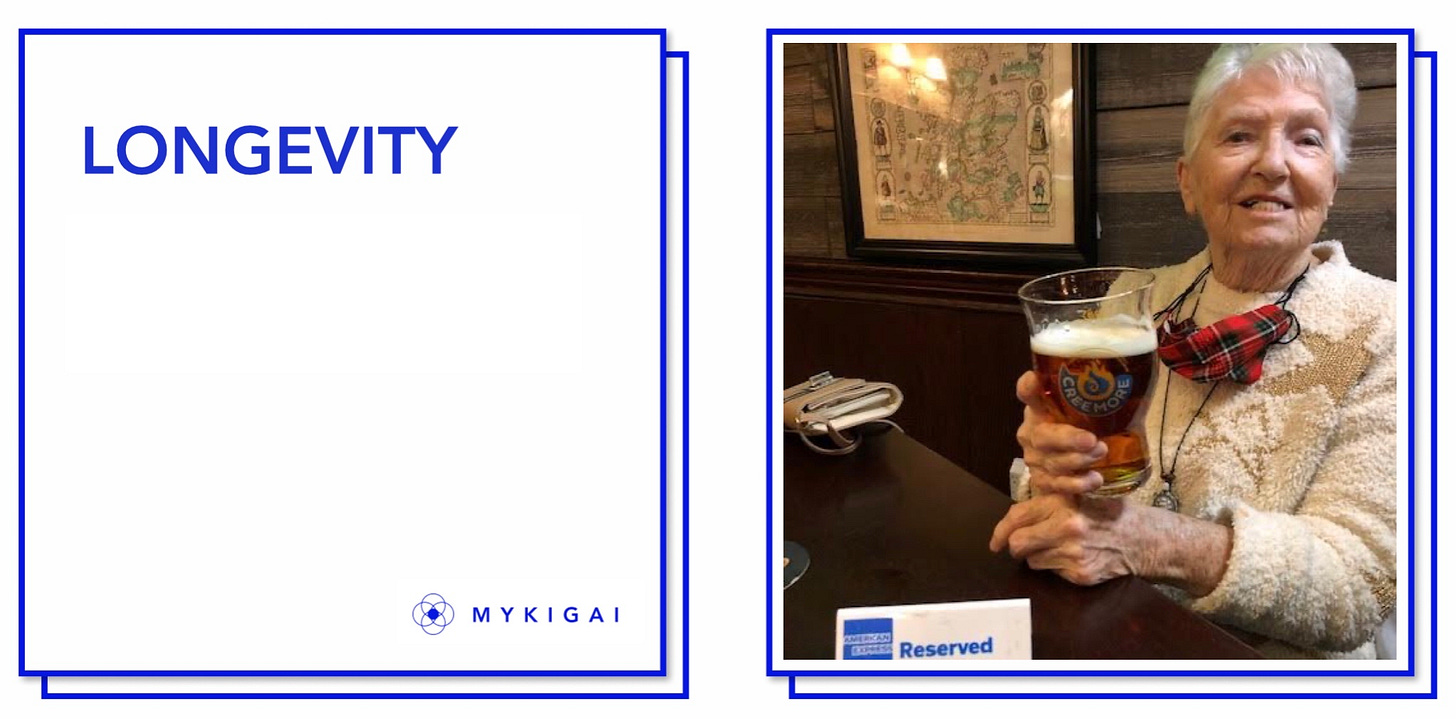🧬🛍 25 - Everyone wants to age like Betty Moir, Is aging a disease?, Global Roadmap for Healthy Longevity
👋 Hello, and welcome to Curation for Longevity by Laura Minquini. I am a longevity advocate, entrepreneur, and the founder of MYKIGAI.
In this newsletter, we delve into longevity as a field and practice and look at what can help make it the next consumer health & lifestyle category. 🚀
We are happy to announce that MYKIGAI comes up for health, longevity lifestyle, and curation, amongst other great keywords in Google search!
Everyone wants to age like Betty Moir
Who is Betty Moir? How is she aging?
Betty Moir is a Canadian 92-year-old who is an ideal example of matching lifespan with health-span. She reads this substack newsletter, books calendly appointments, uses zoom, and loves to wordle. She is like any self-respecting millennial.
Why do I say everyone wants to age like Betty? Because at 92, Betty still drives, has a social life, and lives independently. Who would not want that?
Betty booked a time with me to talk about her experience. When I got on the call she said: “So you want to speak to me about aging?”
I did. I wanted to learn:
What surprised her the most about aging?
What does her lifestyle look like? Was there something she did for her to age healthy?
Here are the major takeaways from our chat:
No one tells you how much you shrink. “What they don't tell you about aging, you don't understand is how small you get. I started at five feet, three and a half. Okay. I'm now under five feet. I've shrunk about four inches. And that's really annoying.”
Get the shingles vaccine. “So anyway, and if you are not aware, I advise everybody to get it”
Betty is lucky. “I ended up at a great job. I was supervisor of office services and I just loved it. I still get a pension from them. I still get benefits from them. So I'm still getting benefits at 92. This is amazing. I can go to the dentist. I can go, you know, I can do, I can travel the world and get, get health coverage. I am in a great situation, I'm in one of the lucky ones, everybody keeps saying you're lucky.”
But even at 92 she still has her doubts. “You're so lucky. You're so lucky. But when I wake up in the morning, Then I wonder why, why am I lucky? You know, because sometimes I don't feel, I feel like that, but you know what? That's just all throughout that happens throughout life.”
You need money. “I've been very blessed in, in being able to work and have enough money which I think is key. If you get old and you have to struggle it is very hard. And I know we have people down in the seniors building who are struggling, but I am not struggling. So that's important. I got very lucky way back in investments. So. Yeah, that's a big thing.”
Some insights into her overall well-being:
Betty, unfortunately, lost her husband to dementia 12 years ago. Talk about the example of how women live longer than men. I was curious to find out what practices could be indicative of her good health. She has shrunk, and has arthritis, which she did tell me sucks, but those things seem unavoidable…for now.
Curiosity: Betty likes to read (a lot) and continue to learn.
Fitness: She golfed for 40 years.
Community: She makes an effort to maintain her social life.
To Betty Moir!
Is aging a disease?
The Lancet published a new commentary by Dr. Kiran Rabheru on questioning if aging a disease.
He first pointed out the benefits:
There is a strong argument that by targeting ageing pathways we could potentially strike at the source of multiple seemingly unrelated diseases.
Advocates of this position believe that such a focus would improve people's healthspans (the interval of life which is largely unaffected by disease) and, in addition, is likely to prolong lifespan as a consequence of removing or delaying the commencement of potentially fatal endogenous diseases.
Moreover, because of possible cross-talk between ageing and disease pathways, there is the possibility of repurposing existing drugs that are already licenced (even The Lancet has typos!) for one disease indication to see if they improve healthspan in healthy individuals.
But hey, who wants more health and/or a longer lifespan with health??? 💁♀️
Why then, if the potential benefits are so large, is viewing ageing as a disease proving so controversial among clinicians?
First, because ageing is a normal process experienced by all, as opposed to a disease state experienced only by some.
Second, because to age is not automatically to deteriorate: chronological ageing is a heterogeneous and potentially plastic process with strong beneficial evidence of lifestyle interventions. Chronological age alone is a poor marker for disease risk.
Third, to characterize ageing as a disease is to risk exacerbating already
globally endemic ageism and age-related discrimination.
And finally, because despite positive preclinical outcomes and huge sums of money being invested into anti- ageing technology start-ups, there is yet to be any clinically substantiated intervention that slows rate of aging.
My water almost dropped out my mouth when I saw what Dr. Rabheru is part of the Global Alliance for the Rights of Older People (GAROP).
I would think that someone working on such a noble cause as protecting the rights of older people would be able to see that the best protection is trying to extend having a healthy mind and body. Frailty makes you insecure, insecurity makes you unconfident, lack of confidence makes you vulnerable.
My response:
Betty, who is by all accounts healthy, is still experiencing health problems such as arthritis, so diseases are experienced by most, not some.
Two is a redundant point to point one.
Ageism and age-related discrimination come with the pathological fear of aging because we have not seen a better way. No one wants to be the fragile character with a desolate, lonely, decaying in a facility. All these permeate the characterization of how we age. Aging is not aspirational, as I said longevity can change this as it is. We need to see more Bettys and less “you need senior products because you are 50”.
Just because no one could fly until the Wright brothers could, it did not mean it was not possible. What kind of self-defeating thought process is this?? Should we throw in the towel and stop trying? Do nothing?
I wonder how this commentary will look in 2050. When there are more people over 65 than people under 15, we could be in the middle of a healthcare crisis and caregiving crisis, and not enough capital or young people to take care of our large aging population. We don’t have to go that far off into the future, life expectancy in the US has been declining.


But I don’t subscribe to fear working as a motivator. Thankfully a new landmark report was recently published on a Global Roadmap for Healthy Longevity (Read more about it below), included as a principle working on systems that work on creating long-term health.
Global Roadmap for Healthy Longevity ⌛️
A recent report by the National Academies of Sciences, Engineering, and Medicine on the Global Roadmap for Healthy Longevity - 200+ pages long - came out recently so I have not had a chance to read it completely. The mission of the report:
“…describes a realistic vision of healthy longevity that could be achieved by 2050. The vision includes full inclusion of people of all ages, regardless of health or functional status, in all aspects of society and societies characterized by social cohesion and equity.”
Some of the contributors to the report are recognizable names in longevity ( biotech), like Mehmood Khan of Hevolution Foundation; Andrew J Scott - London Business School, and Eric Verdin-Buck Institute for Research on Aging.
Some shocking facts:
People in high-income countries have the most years of poor health.
The number of years in poor health has increased globally since 2000 along with life expectancy.
The principles they established:
I can’t wait to delve into it further and highly recommend it for those who want to understand the full spectrum of the societal impact of our longer lives.
Check out our Longevity ToolKits section to learn more about evidence-based recommendations to optimize your health 👉
REMINDER 🎯
Curation for Longevity Members pay 10$ a month or $100 USD/ year to get access to:
Longevity ToolKits + Protocols prepared by our Geroscientist, Girish Harinath
Longevity Drop Special promotions with curated & vetted brands in longevity
Reduced 1-on-1 consultation fee with our Geroscientist if you want personalized health recommendations. Please email us at hello@mykigai.com
BONUS
You support our advocacy work and initiatives.
Time is a valuable resource and we are using ours to promote longevity as field and as a practice. We get a lot of thank yous for all the work we do (🙏💙) and requests to be featured in the newsletter or interviewed on our Let’s Talk Longevity podcast. All of this requires time and a team. Your paid subscription is invaluable to powering all this work and effort and remain unbiased.





